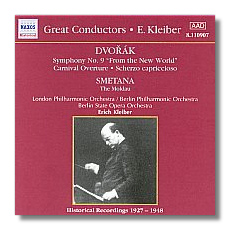
The Internet's Premier Classical Music Source
Related Links
- Dvořák Reviews
- Latest Reviews
- More Reviews
-
By Composer
-
Collections
DVD & Blu-ray
Books
Concert Reviews
Articles/Interviews
Software
Audio
Search Amazon
Recommended Links
Site News
 CD Review
CD Review
Antonín Dvořák

Symphony #9
- Overture Carnival
- Scherzo capriccioso *
- Slavonic Dance, Op. 46, #1
- Symphony #9 in E minor, Op. 95 "From the New World" *
- Bedřich Smetana: Ma Vlast: The Moldau **
London Philharmonic Orchestra/Erich Kleiber
* Berlin Philharmonic Orchestra/Erich Kleiber
** Berlin State Opera Orchestra/Erich Kleiber
Naxos Historical 8.110907 AAD monaural 74:34
This is a new release in Naxos Historical's series of Great Conductors. Erich Kleiber (father of Carlos Kleiber) was born in Vienna in 1890. Early successes in Prague and Darmstadt led to his Berlin debut in 1923. He remained in Berlin at the Staastoper until 1934, when he resigned his post and left Germany to protest the policies and actions of the Nazi party. He didn't return to Europe until 1945, but in the meantime he consolidated his international fame.
Kleiber was closely associated with the music of Beethoven, Johann Strauss II, and Richard Strauss. His youthful experiences in Prague, where he also attended university and conservatory, no doubt prepared him to conduct the Czech repertoire found on this disc.
Carnival was recorded in 1948 with the London Philharmonic. This is a joyful and technically secure reading of Dvořák's most popular overture, and its impact is increased by the quality of the original recording, which was an early title in Decca's "ffrr" series. The Scherzo capriccioso, abridged in this recording in order to fit on two 78rpm sides, was recorded with the Berlin Philharmonic in 1930. The abridgement is unkind, but it was not an uncommon practice at the time, and Kleiber's conducting is kittenish and insinuating. Some traces of pitch instability, a function of the original discs, remain in spite of attempts to correct it.
The remaining works on this CD were recorded with the Staatsoper orchestra between 1927 and 1929. The symphony is played tautly; the introduction is broad and menacing, but the first movement proper (no exposition repeat) is done with grim fire. The Largo is done broadly and is less nostalgic than tragic; some suspect intonation from the wind choir reduces the music's power somewhat. The last two movements are more traditional in nature, although the mood remains serious throughout. This is a strong reading, but not an affectionate one, and the same can be said about the Slavonic Dance. The Moldau is atmospheric, and it too flows with more agitation than peaceful grandeur. Kleiber's numerous interpretive touches enliven this familiar music.
The erudite Mark Obert-Thorn, whose philosophy is to leave the surface noise in, rather than lose any of the musical nuances (a philosophy I applaud), has effected the transfers. He hasn't been given the best original materials to work with, but I gather that at least some of these recordings are somewhat uncommon, so there's no reason to complain too loudly. Because Kleiber is an interesting conductor with a following even today, and because he has not been represented well in the historical recordings market, this release will deservedly be welcomed by many collectors.
Copyright © 2000, Raymond Tuttle


















